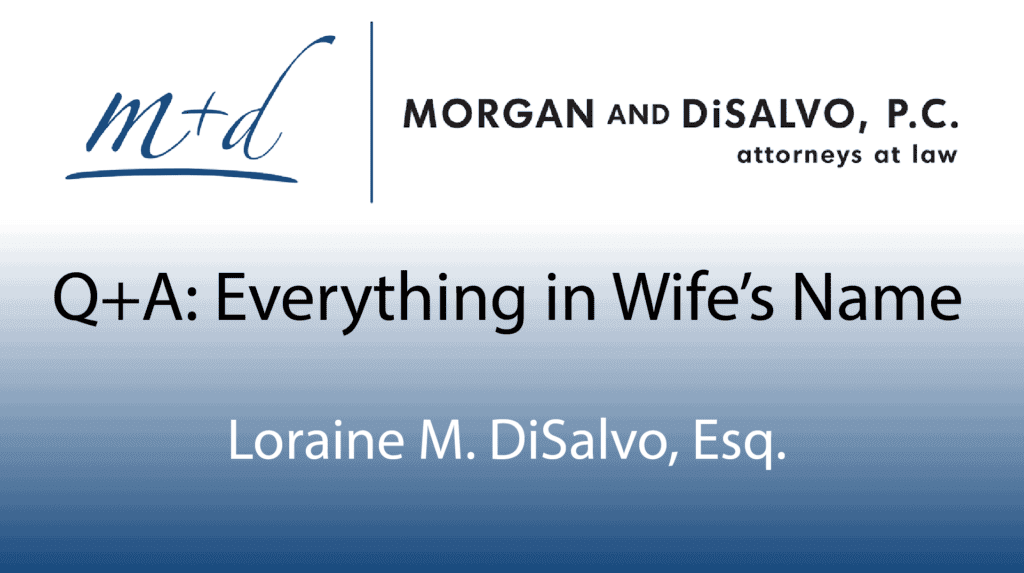Question: When all of a couple’s assets are in the wife’s name, do those assets pass directly to the husband when she dies or can her family, which includes two children, make a claim?
Background: Past financial issues prompted the husband to put all of the couple’s assets, including houses, bank accounts, and cars, in wife’s name.
Loraine’s Answer: Under Georgia law, if a deceased person has a surviving spouse and any children, and if the deceased person dies with no Will, then the deceased person’s assets are distributed as follows:
- Beneficiary designations send the assets they control to the beneficiaries designated, if any (if there is not a specifically designated beneficiary, then the contract that controls the asset in question may provide a default beneficiary, such as the owner’s estate, or, in the case of certain employer-provided benefits, the owner’s spouse). Beneficiary designations generally apply to assets such as retirement accounts (IRAs, 401k accounts, etc.) and life insurance. In Georgia, beneficiary designations can also, but do not always, apply to checking, savings, and taxable investment accounts. Other assets, such as real estate and tangible personal property, generally do NOT have beneficiary designations in Georgia.
- If the deceased person owned anything jointly with another person (or people) as joint tenants with rights of survivorship (or by tenants by the entirety, for assets located in certain other states, but not for Georgia assets), then those assets pass to the surviving owner(s) automatically. Most joint bank and brokerage accounts are owned this way in Georgia, because joint tenancy with a right of survivorship is the default form of joint ownership for Georgia financial accounts. However, real estate owned jointly in Georgia is NOT owned this way unless the deed contains specific language designed the create the joint tenancy with rights of survivorship in addition to the owners’ names.
- Any other assets of the deceased person become part of his probate estate. The estate assets are generally to be used to pay debts, taxes, and expenses. Any remaining assets will generally be divided between the deceased person’s heirs, if there is no Will. If a deceased person has both a surviving spouse and one or more children, then the spouse and the children are all heirs. In Georgia, a surviving spouse and children will normally receive equal shares as heirs (except that the spouse must get at least 1/3, so that if there are more than 2 children the spouse gets 1/3 and the children divide the rest). However, if the surviving spouse makes a claim for a year’s support from the estate, and if the year’s support claim is not successfully challenged by any other heir, then the surviving spouse may get a larger share or all of the estate’s assets, and may even be able to take assets that would otherwise have to have been used to pay the estate’s creditors. (A minor child (one who is under 18 years old) can also make a year’s support claim.)
So, to summarize: The general answer is NO, a surviving spouse does not automatically get all of a deceased spouse’s assets. However, if the surviving spouse makes a successful claim for a year’s support under Georgia law, the spouse may end up receiving the entire estate.
In general, a married couple, especially one where either or both of the spouses have children from one or more prior relationships, should do estate planning, instead of relying on state law, rights of survivorship, and beneficiary desigations. Using good estate planning, each spouse can ensure that the surviving spouse receives assets from the first spouse to die in whatever manner that first spouse wishes, and that the first spouse’s other desired beneficiaries receive whatever the first spouse wants those beneficiaries to have. In a case where a couple has placed most or all of their asset in only one spouse’s name for other reasons, such as the scenario you present, it can be even more critical for them to undertake proper estate planning to ensure that each spouse is adequately protected and that the assets end up passing the way they intend at each spouse’s death.
Key Estate Planning Takeaway: Estate planning helps to ensure that your assets pass to the beneficiaries you wish, in the manner you intend. Proper estate planning can allow your wishes to be honored while also helping reduce the risk of confusion and family drama after a death, which is generally a time when emotions run high and objectivity may be compromised.
This “Q&A with Loraine” blog series features answers from Morgan + DiSalvo Partner Loraine DiSalvo to questions posted on www.avvo.com. A key takeaway from each exchange highlights an important facet of estate planning.


